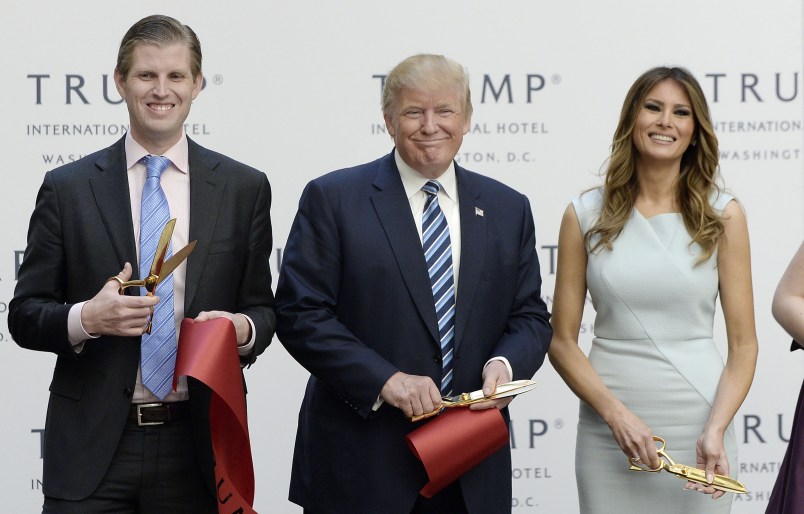There’s a lot of different reasons why foreign officials might want to patronize the President’s hotel chain, apart from indirectly paying him, Justice Department attorneys wrote in a Feb. 21 appellate brief.
It’s possible, Trump attorneys write, that customers who wish to “curry favor with the President might continue to do so by supporting his family’s business and brand even if he lacked a personal financial interest.”
They add that the President removing his stake in his businesses wouldn’t necessarily stop foreign governments from attempting to use the Trump Org to influence the White House.
“Indeed, plaintiffs’ own amici emphasize that foreign governments will ‘seek every advantage’ to influence our government,” the document reads.
The filing came in an appeal by Trump’s attorneys of a case filed by the Maryland and D.C. attorneys general, accusing him of violating the Constitution’s emoluments clause by maintaining a stake in his businesses, which allegedly receive money from foreign government officials. Trump filed an emergency appeal in the case in December to halt discovery. The appeal is being heard by the Fourth Circuit Court of Appeals, based in Richmond, Virginia.
“The point is that none of this intrusive discovery should be allowed in this improper official-capacity suit against a sitting President,” DOJ attorneys representing Trump in his capacity as president wrote in the brief.
Federal attorneys devote much of the filing to parsing the language of the founders. With multiple briefs filed by Constitutional law professors and linguists on both sides of the case, the precise definition of “emolument” as rooted in its 18th century usage has become a quirky focal point of the case.
Trump is arguing for a narrow reading of the word — defined down from a broader definition of any “benefit” or “advantage” — in favor of a meaning that would restrict it to cover “profit arising from an office or employ.”
The argument is crucial to the President’s overriding contention that an Emoluments clause violation only occurs when the president is paid to use his office to perform a specific act, as opposed to the contention from the attorneys general that receiving any payment or benefit from a foreign government counts as a violation.
“The Clauses do not prohibit an officer from merely receiving profits from a business engaged in commercial transactions with government customers,” the filing from Trump’s lawyers states.
Trump’s team goes on to cite Obama’s receipt of royalties from sales of his books in foreign countries, arguing to the appeals court that it’s impossible to draw a line between that and the President’s D.C. hotel.
They add that the intent of a foreign government official in buying something related to a sitting president is irrelevant to whether it counts as an Emoluments violation.
“That is why President Obama did not violate the Emoluments Clauses regardless of why any government customers purchased his books and indirectly paid him royalties,” DOJ attorneys wrote.
The Fourth Circuit Court of Appeals will hear oral arguments in the case next month.










